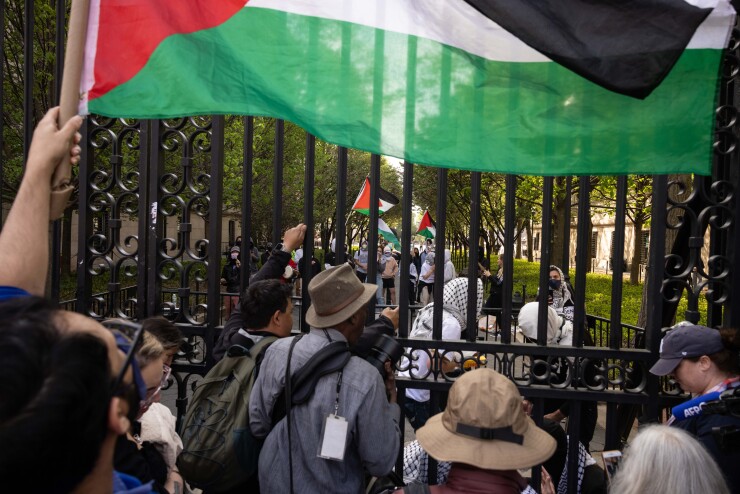The
Mahmoud Khalil, who until recently was a student at Columbia University, was arrested by
But Tuesday, the White House said his residency was revoked by Secretary of State Marco Rubio who, under the Immigration and Nationality Act, can do so in cases where it's determined that a foreigner's presence is detrimental to U.S. foreign policy. A judge temporarily blocked Khalil's deportation and set a hearing for Wednesday on Khalil's request to return from Louisiana, where he's being detained.
Read more:
The provision cited as justification for Khalil's deportation is rarely used. Lawmakers have warned that it should be employed only in unusual circumstances because it's up to the discretion of the secretary of state, according to immigration attorneys interviewed by Bloomberg. Typically, revoking a green card is done through the Department of Homeland Security and involves allegations of fraud or criminal activity.
"The question to me is who's next?" said David Leopold, a partner at UB Greensfelder LLP who focuses on immigration cases. "You don't have to have done anything to be removed under this. I suppose you have to symbolize something."
There are separate provisions that would allow for removing green card holders for acts related to terrorism or war crimes.
President Donald Trump has said Khalil's arrest is the "first of many to come."
Khalil, one of the main negotiators for Columbia's protest group, is challenging his arrest, saying it was an unlawful government retaliation for his "constitutionally protected peaceful advocacy," according to filings in New York federal court.
Read more:
"This is an individual who organized group protests that not only disrupted college campus classes and harassed Jewish American students and made them feel unsafe on their own college campus, but also distributed pro-Hamas propaganda, flyers with the logo of Hamas," White House Press Secretary Karoline Leavitt told reporters Tuesday.
"We have a zero-tolerance policy for siding with terrorists, period."
Protest Marches
A petition demanding Khalil's immediate release has been signed 2.6 million times, and several protest marches have been held in New York City.
The provision being used by Rubio was upheld in a 1999 ruling by the Justice Department's Board of Immigration Appeals in a case involving the removal of a former Mexican government official.
Khalil, who was born in Syria, was arrested March 8 outside of his off-campus Columbia housing, court filings show. U.S. agents told him that his student visa and green card had been revoked by the State Department.
After the arrest, Rubio posted on X: "We will be revoking the visas and/or green cards of Hamas supporters in America so they can be deported."
Columbia was the site of prolonged student protests after the Oct. 7 attack by Hamas on Israel, which killed 1,200 people. Israel's subsequent war with Hamas killed more than 48,000 Palestinians, according to the Hamas-run health ministry in Gaza.
Encampments enveloped Columbia's West Lawn for several weeks in April, inspiring similar protests at colleges across the country. The demonstrations at Columbia culminated in a takeover of a campus building by dozens of students and outsiders, who barricaded themselves inside, prompting several arrests.
Read more:
CUAD, the Columbia protest group Khalil helped lead, pushed for transparency from Columbia's endowment and divestment from companies with ties to Israel, as well as for the school to sever its relationship with Israeli academic institutions. In August, Khalil told The Hill that activism would continue on campus by "any available means necessary to push Columbia to divest from Israel."
Hamas Flyers
On Tuesday, Leavitt said the Department of Homeland Security had provided her with copies of flyers and pamphlets allegedly distributed by Khalil. Images of the flyers provided by the White House included one with an image of the late Hamas leader Yahya Sinwar, while another depicted a document from the "Hamas Media Office" explaining its "narrative" for "Operation Al-Aqsa Flood," a reference to the Oct. 7 attacks.
Amy Greer, Khalil's attorney, didn't respond to a message seeking comment on the flyers.
Revoking a green card is usually a prolonged process because the holder has been vetted and is on the path to being eligible to become a U.S. citizen. Khalil can still fight to stay in the U.S. under various grounds, and deportation proceedings can take years if the person fighting removal is allowed out of jail. The process can be far faster for those detained.
"We will vigorously be pursuing Mahmoud's rights in court, and will continue our efforts to right this terrible and inexcusable – and calculated – wrong committed against him," Greer said in an earlier statement.
Khalil completed his master's program in public administration in December and was set to graduate in May, according to his lawyers. His wife is eight months pregnant. He entered the U.S. in December 2022 on a student visa and obtained his permanent residency last year.
As an advocate for Palestinian rights, he is "committed to calling on the rest of the world to protect the rights of Palestinians" and to end the violence against them, his lawyers wrote.
Khalil said he was subjected in the past two months to "profound" online harassment, leading him to email Columbia administrators for support. On March 7, he emailed interim President Katrina Armstrong, describing the "vicious and dehumanizing" campaign against him, including people "falsely labeling him a terrorist threat and calling for his deportation," according to a Monday court filing






